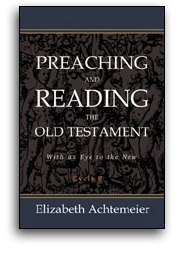SermonStudio
Proper 28
Preaching
Preaching And Reading The Old Testament Lessons
With an Eye to the New
Let us first give an historical accounting of the text. It obviously forms the introduction to the Samuel stories, 1 Samuel 1 to 2 Samuel 25:1, showing how Samuel was dedicated to the service of the Lord as a Nazarite from the day of his birth to his death. The time is the period of the Judges, 1220--1020 B.C., and Samuel is the last to fill that office in Israel, the judges then being replaced by the monarchy under Saul.


